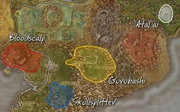The Gurubashi Empire, made up of various kingdoms,[citation needed] was once one of the most powerful forces of Azeroth, controlling much of the southern part of the eastern continents. Their former capital of Zul'Gurub is located in Stranglethorn Vale. Eventually, this great nation[citation needed] splintered into separate tribes.
History[]
- Main article: The Twin Empires
About 16,000 years ago (long before the Highborne called down the wrath of the Burning Legion), Trolls lorded over much of Kalimdor (then a single continent). There were twin troll empires — the Gurubashi of the southeastern jungles and the Amani of the middle forestlands.
There were smaller tribes that lived far to the north (in the region now known as Northrend). These tribes founded a small nation known as Gundrak, but never achieved the size or prosperity of the southern empires.
The Gurubashi and Amani empires had little love for one another, but rarely warred against each other. At the time, their greatest common enemy was a third empire - the civilization of Azj'Aqir. The Aqir were intelligent insectoids who ruled the lands of the far west. These clever insectoids were greatly expansionistic and incredibly evil. The Aqir were obsessed with eradicating all non-insect life from the fields of Kalimdor.
The trolls fought them for many thousands of years, but never succeeded in winning a true victory over the Aqir. Eventually, due to the troll's persistence, the Aqiri kingdom split in half as its citizens fled to separate colonies in the far northern and southern regions of the continent.
Two Aqiri city-states emerged - Azjol-Nerub in the northern wastes and Ahn'Qiraj in the southern desert. Though the trolls suspected that there were other Aqiri colonies beneath Kalimdor, their existence was never verified.
With the insectoids driven into exile, the twin troll empires returned to business as usual. Despite their great victory, neither civilization expanded much further than their original boundaries.
Present-Day Zul'Gurub[]

The location of the scattered Gurubashi tribes, not listed are the Darkspear who left for Kalimdor.
Several thousand years ago the powerful Gurubashi Empire was torn apart by a massive civil war. An influential group of troll priests, known as the Atal'ai, called forth the avatar of an ancient and terrible blood god named Hakkar the Soulflayer. Though the priests were defeated and ultimately exiled, the great troll empire collapsed upon itself. The exiled priests fled far to the north, into the Swamp of Sorrows, where they erected a great temple to Hakkar in order to prepare for his arrival into the physical world.
In time, the Atal'ai priests discovered that Hakkar's physical form could only be summoned within the ancient capital of the Gurubashi Empire, Zul'Gurub. Unfortunately, the priests have met with recent success in their quest to call forth Hakkar -- reports confirm the presence of the dreaded Soulflayer in the heart of the Gurubashi ruins.
Var'gazul, Min'loth and the Fall of Gurubashi[]
It is told in The Fall of Gurubashi, that the last chief (or emperor) of Gurubashi was one Var'gazul. From his capital he prepared plans of war, an invasion on unknown enemy. However his plans were thwarted by appearance of Neptulon and his Krakken, who destroyed all of the land west of Zul'Gurub and sunk the city (or region) of I'lalai.
Tribes[]
All known jungle troll tribes were once part of the Gurubashi Empire. In addition, the Sandfury tribe of sand trolls was also part of the Gurubashi Empire.
Settlements of Gurubashi Empire[]
Majority if not all of the Gurubashi Empire is located in Azeroth subcontinent of Eastern Kingdoms. The following is a list of ruins that are currently associated with tribes descended from the Gurubashi Empire and given their antiquity are also likely to be part of the Gurubashi Empire during its reign.
- Stranglethorn Vale
- Aboraz
- Balia'mah
- Bal'lal
- Gurubashi Arena
- I'lalai
- Jubuwal
- Kal'ai
- Mizjah
- Tkashi
- Ziata'jai
- Zul'Gurub
- Zul'Kunda
- Zul'Mamwe
- Zuuldaia
- Tanaris
- Zul'Farrak
- Southmoon
- Noonshade
| ||||||||||||||||||||||||||
